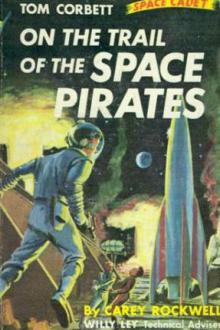Triplanetary, E. E. Smith [reading like a writer TXT] 📗

- Author: E. E. Smith
Book online «Triplanetary, E. E. Smith [reading like a writer TXT] 📗». Author E. E. Smith
“Chemical Engineers … shell loading plant … within seventy-five miles of Townville … over five years experience … organic chemistry … technology … explosives. …”
“They want you,” Eunice declared, soberly.
“Well, I’m a Ph. D. in Organic. I’ve had more than five years experience in both organic chemistry and technology. If I don’t know something about explosives I did a smart job of fooling Dean Montrose, back at Gosh Whatta University. I’ll write ’em a letter.”
He wrote. He filled out a form. The telephone rang.
“Kinnison speaking … yes … Dr. Sumner? Oh, yes, Chief Chemist. … That’s it—one year over age, so I thought. … Oh, that’s a minor matter. We won’t starve. If you can’t pay a hundred and fifty I’ll come for a hundred, or seventy five, or fifty. … That’s all right, too. I’m well enough known in my own field so that a title of Junior Chemical Engineer wouldn’t hurt me a bit … OK, I’ll see you about one o’clock … Stoner and Black, Inc., Operators, Entwhistle Ordnance Plant, Entwhistle, Missikota. … What! Well, maybe I could, at that. … Goodbye.”
He turned to his wife. “You know what? They want me to come down right away and go to work. Hot Dog! Am I glad that I told that louse Hendricks exactly where he could stick that job of mine!”
“He must have known that you wouldn’t sign a straight-salary contract after getting a share of the profits so long. Maybe he believed what you always say just before or just after kicking somebody’s teeth down their throats; that you’re so meek and mild—a regular Milquetoast. Do you really think that they’ll want you back, after the war?” It was clear that Eunice was somewhat concerned concerning Kinnison’s joblessness; but Kinnison was not.
“Probably. That’s the gossip. And I’ll come back—when hell freezes over.” His square jaw tightened. “I’ve heard of outfits stupid enough to let their technical brains go because they could sell—for a while—anything they produced, but I didn’t know that I was working for one. Maybe I’m not exactly a Timid Soul, but you’ll have to admit that I never kicked anybody’s teeth out unless they tried to kick mine out first.”
Entwhistle Ordnance Plant covered twenty-odd square miles of more or less level land. Ninety-nine percent of its area was “Inside the fence.” Most of the buildings within that restricted area, while in reality enormous, were dwarfed by the vast spaces separating them; for safety-distances are not small when T.N.T. and tetryl by the ton are involved. Those structures were built of concrete, steel, glass, transite, and tile.
“Outside the Fence” was different. This was the Administration Area. Its buildings were tremendous wooden barracks, relatively close together, packed with the executive, clerical, and professional personnel appropriate to an organization employing over twenty thousand men and women.
Well inside the fence, but a safety-distance short of the One Line—Loading Line Number One—was a long, low building, quite inadequately named the Chemical Laboratory. “Inadequately” in that the Chief Chemist, a highly capable—if more than a little cantankerous—Explosives Engineer, had already gathered into his Chemical Section most of Development, most of Engineering, and all of Physics, Weights and Measures, and Weather.
One room of the Chemical Laboratory—in the corner most distant from Administration—was separated from the rest of the building by a sixteen-inch wall of concrete and steel extending from foundation to roof without a door, window, or other opening. This was the laboratory of the Chemical Engineers, the boys who played with explosives high and low; any explosion occurring therein could not affect the Chemical Laboratory proper or its personnel.
Entwhistle’s main roads were paved; but in February of 1942, such minor items as sidewalks existed only on the blueprints. Entwhistle’s soil contained much clay, and at that time the mud was approximately six inches deep. Hence, since there were neither inside doors nor sidewalks, it was only natural that the technologists did not visit at all frequently the polished-tile cleanliness of the Laboratory. It was also natural enough for the far larger group to refer to the segregated ones as exiles and outcasts; and that some witty chemist applied to that isolated place the name “Siberia.”
The name stuck. More, the Engineers seized it and acclaimed it. They were Siberians, and proud of it, and Siberians they remained; long after Entwhistle’s mud turned into dust. And within the year the Siberians were to become well and favorably known in every ordnance plant in the country, to many high executives who had no idea of how the name originated.
Kinnison became a Siberian as enthusiastically as the youngest man there. The term “youngest” is used in its exact sense, for not one of them was a recent graduate. Each had had at least five years of responsible experience, and “Cappy” Sumner kept on building. He hired extravagantly and fired ruthlessly—to the minds of some, senselessly. But he knew what he was doing. He knew explosives, and he knew men. He was not liked, but he was respected. His building was good.
Being one of the only two “old” men there—and the other did not stay long—Kinnison, as a Junior Chemical Engineer, was not at first accepted without reserve. Apparently he did not notice that fact, but went quietly about his assigned duties. He was meticulously careful with, but very evidently not in any fear of, the materials with which he worked. He pelleted and tested tracer, igniter, and incendiary compositions; he took his turn at burning out rejects. Whenever asked, he went out on the lines with any one of them.
His experimental tetryls always “miked” to size, his T.N.T. melt-pours—introductory to loading forty-millimeter on the Three Line—came out solid, free from checks and cavitations. It became evident to those young but keen minds that he, alone of them all, was on familiar ground. They began to discuss their problems with him. Out of his years of technological experience, and by bringing everyone present into the discussion, he either helped them directly or helped them to help themselves. His stature grew.
Black-haired, black-eyed “Tug” Tugwell, two hundred pounds of ex-football-player





Comments (0)